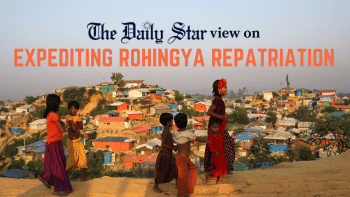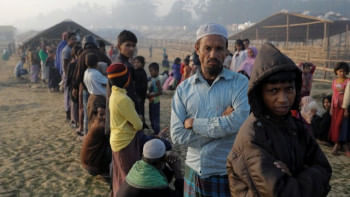No respite for the Rohingya

The future of thousands of Rohingya refugees looks even bleaker after a massive fire ripped through a crammed refugee camp in the Ukhiya upazila of Cox's Bazar on Sunday. Reportedly, nearly 2,000 shelters were burned to the ground by the fire, rendering around 15,000 Rohingya homeless before it was brought under control. Although the extent of the damage is yet to be fully determined, as well as the cause of the fire, it is obvious that the affected refugees need urgent assistance and humanitarian support.
According to reports, the authorities there have been working with international and local humanitarian organisations to provide food and temporary shelters to those who have lost their homes. Aside from houses, the fire also burnt down around 90 facilities including hospitals, learning centres and mosques, and robbed hundreds of families of whatever belongings they had. Such devastation will only increase the suffering of the refugees, who have been stuck in a cycle of relentless problems for more than five years.
The latest setback comes at a time when the international community has been reducing their support for the Rohingya ever since the pandemic started in 2020. Only recently, this newspaper reported that the United Nations was preparing to cut food aid to the Rohingya refugees. In fact, starting this month, the UN's World Food Programme plans to reduce the value of its food assistance to only $10 per person, from what was already a meagre $12. Despite two UN special rapporteurs calling this move "unconscionable" – saying it will have devastating impacts on the refugees – we have not yet heard of any change to this plan, nor of wealthier nations stepping up to cover for the shortage of funds.
The recent fire should once again be a reminder to the whole world about just how vulnerable the life of Rohingya refugees is, and the type of support they require. This is the third major fire in three years in the Rohingya camps, and time and again we have seen the Rohingya struggle, trying to overcome their misfortunes. The least the world community can do is provide them with adequate humanitarian support following such a major disaster. But that's not all; this fire is also a clear reminder that such makeshift refugee camps can never guarantee a sustainable and safe future for the Rohingya. The international community should get back to working on a permanent solution to the Rohingya refugee crisis – something that has been put on the back-burner of agendas for quite some time.
The Bangladesh government, while appealing for urgent aid from the international community, also needs to reevaluate the make-up of the refugee camps. Because the huts in these camps are mostly made up of bamboo and tarpaulin – all closely packed together – they are particularly susceptible to fires. Perhaps some redesigning of the camps is in order so that such devastating fires can be avoided in the future. This, of course, will require expensive rebuilding and rehabilitation, and consequently increased – rather than decreased – funding.

 For all latest news, follow The Daily Star's Google News channel.
For all latest news, follow The Daily Star's Google News channel. 









Comments